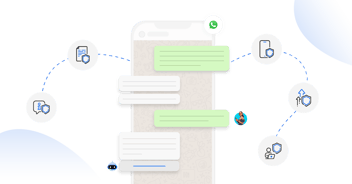Conversational AI has already started to disrupt the insurance sector. AI-powered insurance chatbots and virtual assistants have made the customer care experience a lot more seamless – instantly resolving routine queries end-to-end, automating the claims filing process, and more. They also serve as a powerful tool for lead generation – engaging prospective customers and offering personalized policy recommendations on the basis of their profile and requirements.
In the here and now, AI Assistants do a lot to offer insurance customers a better experience and help insurance agents do their jobs more efficiently. But the technology is still relatively new, and over time, there’s a lot more that it can accomplish in this sector.
Here’s a quick rundown on some of the developments and the future of Conversational AI in Insurance:
Personal Insurance Assistants

Our smartphones already hold the key to a large part of our personal and professional lives – and equipped with AI-powered personal digital assistants, their ability to help us manage a wide range of daily tasks is vastly enhanced. Your personal digital assistant can help you organize your calendar, pay your bills, and book travel. What if it could get you insurance as well?
Personal digital assistants could, in the future, effectively ‘sync up’ with the Intelligent Virtual Assistant (IVA) of an insurer to help a customer gain access to insurance on-demand. For e.g. consider a scenario wherein a business traveler hires a car online to get around for meetings when he arrives at his destination.
After helping him hire the car, his personal assistant collaborates with the IVA of his preferred auto-insurance firm to swiftly provide him with a quote. If, during the course of his trip, the traveler gets into an accident that damages the hired vehicle, all he needs to do is upload a few photos of the damage to the auto-insurance chatbot. Processing the visual information from the photos, the chatbot will immediately make an assessment of the damage and process his claim.
LEARN MORE: 5 Conversational AI Use Cases for Insurance
Internet of Things (IoT)
.png?quality=low&width=640&name=Internet%20of%20Things%20(IoT).png)
IoT (Internet of Things) will allow us to take the scenario described above a step further. For instance, if the traveler was driving a ‘smart car’, its sensors could immediately make an assessment of the damage and communicate this to the auto-insurers chatbot, who will then inform the customer of the extent of the damage and the repair costs, and maybe even offer to send a mechanic to his location to help!
The same applies to homeowners with ‘smart appliances’. For instance, if your air conditioner has not been functioning properly, its smart sensors can assess the damage and inform the owner, via chatbot, of the repairs/replacements required, and what your insurance coverage for the air conditioner entitles them to.
IoT combined with Conversational AI in effect creates a world where your vehicles, appliances and homes ‘talk’ to insurers – assessing damage, and determining the cost of repairs and the size of the claim – sparing the customer the long process of needing to get a mechanic to assess the damage and then following up with the insurance company to review his/her coverage and get the claim processed.
Explore How to Gain Tremendous Competitive Advantage By Using Automation In Insurance
Voice Assistants

A report by Juniper Research estimates that there will be 8 billion voice assistants in use by 2023. Smart speakers have seen widespread adoption over the last several years, and voice assistants like Google Assistant, Amazon’s Alexa and Apple’s Siri are now ubiquitous.
Conversational commerce through voice assistants is already a reality, with 71% of consumers expressing a preference for using voice to search for products. Why not for insurance as well?
Over the next few years, as the capabilities of voice-based Conversational AI continue to grow, and customers become more comfortable using them for an even wider range of product/service categories, it may well become commonplace to treat your smart speaker like an insurance sales agent or customer care representative – accessing information about their policies, checking on the status of a claim, seeking policy recommendations, and even making a purchase etc.
LEARN MORE: Why Conversational AI is the Perfect Lead Generation Tool for Brands
Being able to research or access insurance over voice significantly enhances customer convenience by offering a virtually effortless experience – sparing them the need to even key in queries on their smartphones!
Imagine, in the very near future, having an insurance agent you can literally just talk to any time for any of your insurance needs, on your smartphone or smart speaker. Voice assistants already have these capabilities – the next few years will see them become commonplace, and possible the way the vast majority of customers will engage with their insurers.
Looking Ahead
While a lot of these scenarios may seem a little too good to be true, keep in mind that the technologies required to make all of these possible already exist. The rapid pace of advancement of Conversational AI, and other technologies such as IoT, will ensure that over the next few years, these innovations became the norm when it comes to interactions between customers and insurance brands.
A key challenge that the insurance sector faces is the complexity of the processes around selecting and purchasing policies, as well as managing one’s policies and filing claims. AI Assistants are already helping insurers elevate their customer experience by making these processes seamless over a conversational interface. The innovations we’ve discussed will take this engagement even further.
The future of insurance will be here sooner than you think!
The State of Insurance Chatbots in 2022: Use cases, Reports, case studies, and more.









.png?quality=low&width=352&name=Linkedin+%20Twitter%20(2).png)


